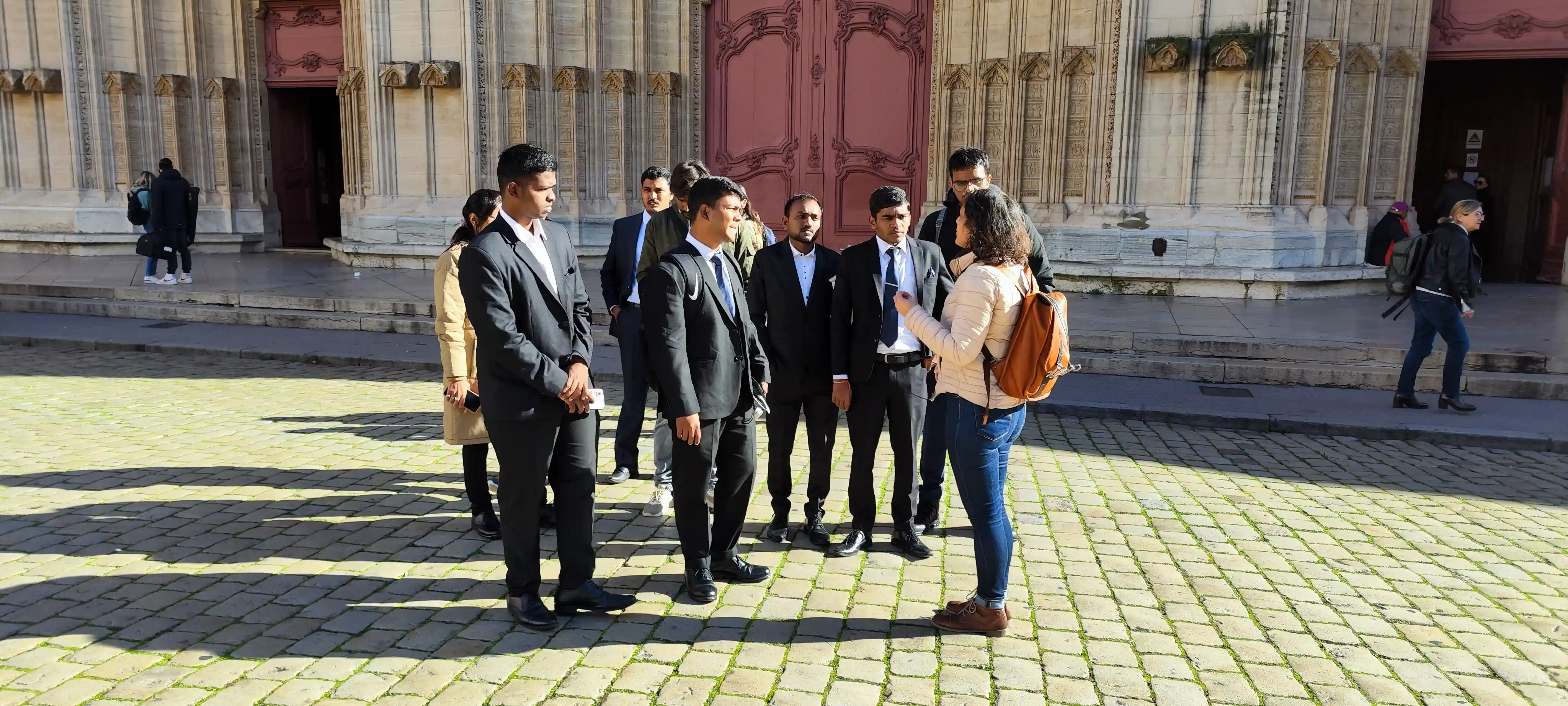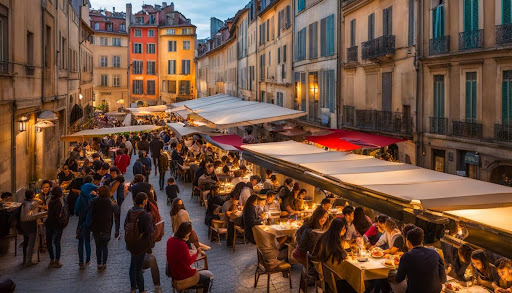France stands out as the best country for hotel management due to its rich history in hospitality, world-renowned culinary traditions, and a strong network of luxury hotels. Its combination of rigorous education programmes and a thriving tourism industry creates unmatched opportunities for hotel managers to develop and excel.
Hotel reception area in France with staff assisting guests in a bright and elegant lobby.
The country hosts some of the top hotel schools globally, which focus on both theoretical knowledge and practical experience. This ensures professionals trained in France are well-equipped to meet the standards of the global hospitality market.
Additionally, France’s diverse landscape and popularity as a tourist destination provide an ideal environment for hotel management careers. The constant demand for high-quality service in major cities and resort areas offers valuable real-world experience.
World-Class Hospitality Education
France provides exceptional education in hospitality, combining established institutions, modern course content, and recognised qualifications. Students receive practical skills and theoretical knowledge aligned with global industry demands.
Leading Hotel Management Schools
Top France schools like Aura Lyon and Aura International school of management attract international students. These institutions focus on hands-on training paired with academic excellence. Aura Lyon is often cited for its rigorous approach to hospitality management, emphasising leadership and operational skills. Aura International school of management offers specialised programmes across hotel, and Emba, with strong industry links.
Practical internships and exposure to French luxury hotel chains give students a competitive edge. The network built through alumni and partnerships opens doors worldwide.
Innovative Curriculums
French hotel management courses combine traditional hospitality principles and modern business techniques. Programmes integrate technology, sustainability, and digital marketing.
Students study areas such as revenue management, customer experience, and supply chain logistics. Group projects simulate real-world hotel challenges, fostering problem-solving and teamwork.
Language skills are a priority, with many programmes taught in both French and English. Curriculum updates reflect current hospitality trends, ensuring relevance.
International Accreditation
French hospitality schools often hold multiple international accreditations. These include AACSB, EFMD, and I-CHRIE certifications, which verify high educational standards.
Accreditations guarantee courses meet global industry benchmarks. They also facilitate student exchanges and degree recognition abroad.
Institutions collaborate with international associations, providing students access to global research and best practices. This enhances graduate employability in multinational hotel groups.
Unmatched Professional Opportunities
France offers practical connections with leading hotel chains, excellent job prospects for graduates, and valuable internship placements that build real-world skills.
Strong Industry Partnerships
French hotel management schools maintain close ties with international and domestic hotel groups. These partnerships involve collaboration on curriculum development, ensuring students learn relevant, up-to-date industry practices. Schools like Vatel and Les Roches regularly invite industry experts for guest lectures and workshops.
Hotels such as Accor, Marriott, and Ritz Paris actively participate in recruitment events and knowledge-sharing sessions. This cooperation creates a pipeline for students to access job openings and mentorship opportunities. Networking with major players during training significantly enhances graduates’ career prospects.
High Graduate Employability
Employment rates for French hotel management graduates consistently exceed 85% within six months of graduation. The combination of practical skills and industry connections makes them highly attractive to employers globally. Many find roles in management, operations, and customer service quickly upon entering the workforce.
French institutions highlight specialised courses that focus on areas like luxury hospitality and event management. This focused training helps align graduates with niche sectors. The frequent career fairs and employer engagement also streamline the transition from education to employment.
Internship Placements in Prestigious Hotels
Internships are a mandatory part of hotel management programmes in France. Students spend several months working in renowned hotels such as Hôtel de Crillon in Paris or the InterContinental Carlton in Cannes.
These placements are carefully matched to students’ career goals and programme specialisations. Working alongside experienced professionals, students acquire hands-on experience in daily operations, guest relations, and management techniques. The prestige of the internship location often leads to permanent job offers.
Rich Culinary and Cultural Heritage
France offers a unique blend of culinary mastery and cultural sophistication that profoundly shapes its hotel management industry. This heritage informs both the quality of service and the guest experience, providing hotel professionals with deep-rooted knowledge and skills.
Influence of French Cuisine in Hospitality
French cuisine is a global benchmark for luxury and finesse, deeply integrated into hotel management education and practice. Hotels in France prioritise gastronomic excellence, often featuring Michelin-starred restaurants or collaborations with renowned chefs.
This culinary tradition extends beyond food preparation to include wine service, presentation, and menu curation. It ensures that hospitality professionals understand flavours, techniques, and the importance of sourcing local, fresh ingredients.
Such expertise equips hoteliers to create immersive dining experiences that enhance a guest’s stay. The fusion of culinary arts and hotel services in France sets a high standard recognised worldwide.
Tradition of Excellence in Service
Service excellence has been a cornerstone of French hospitality for centuries. French hotel management emphasises attention to detail, politeness, and personalised service tailored to individual guest needs.
Training often includes mastering specific protocols, such as table settings, guest greetings, and service timing, which contribute to a seamless and memorable visitor experience. This rigorous approach builds professionalism and discipline within the workforce.
Hotels maintain an environment where staff anticipate and exceed guest expectations consistently. The cultural expectation of refinement pushes hotels to continuously improve their service standards.
Cultural Diversity and Guest Experience
France’s rich cultural landscape, influenced by its regions and international connections, enriches the hospitality sector. Hoteliers learn to accommodate diverse guests by respecting different customs, languages, and preferences.
Multicultural exposure encourages adaptability and creativity in service delivery. Staff are trained to manage culturally varied expectations, which enhances guest satisfaction and fosters loyalty.
The country’s dynamic history and art also allow hotels to integrate cultural experiences into their offerings, such as themed culinary events and art exhibitions. This approach deepens the guest’s connection to place and culture.
Strategic Location in the Heart of Europe
France’s central position in Europe provides easy access to key cities and tourist destinations. This location supports strong connectivity and steady visitor flows, critical for hotel management professionals.
Accessibility to Major Travel Hubs
France is home to several major airports such as Charles de Gaulle in Paris, Lyon–Saint-Exupéry, and Nice Côte d’Azur. Charles de Gaulle ranks as one of the busiest international airports in Europe, facilitating direct flights to numerous continents.
High-speed rail networks like the TGV connect French cities with neighbouring countries including Belgium, Germany, Switzerland, and Spain.
These transport links allow hotels to cater to diverse guests from business travellers to long-haul tourists. Easy accessibility improves occupancy rates and streamlines operations, which benefits hotel management strategies.
Tourism Hotspot
France regularly ranks among the world’s top tourist destinations. Paris alone attracts over 30 million visitors annually, drawn by landmarks such as the Eiffel Tower and Louvre Museum.
Regions like the French Riviera, Provence, and the Loire Valley generate a year-round demand for accommodation. The country’s mix of urban and rural attractions supports various hotel categories, from luxury resorts to boutique hotels.
This tourism variety provides hotel managers with opportunities to specialise in different market segments, enhancing career prospects and industry knowledge.
Government and Industry Support
France’s hotel management sector benefits from strict quality controls and significant public and private investment. This creates an environment that encourages high standards and continuous growth in hospitality services.
Robust Regulations for Quality Assurance
The French government enforces stringent regulations to maintain high standards in the hotel industry. These rules cover safety, hygiene, and service quality, ensuring consistent guest experiences.
Regular inspections by local authorities check compliance with fire safety, food hygiene, and accessibility standards. Hotels must also meet criteria set by the national ranking system, which categorises hotels from 1 to 5 stars based on specific requirements.
This regulatory framework encourages hotels to maintain excellent standards, attracting international travellers seeking reliable and safe accommodations.
Investment in Hospitality Infrastructure
France invests heavily in hospitality infrastructure, both through government funding and industry partnerships. This includes upgrading transport links, training facilities, and tourism sites that boost hotel demand.
Major cities and tourist regions receive funds for modernising airports, rail networks, and local amenities. Moreover, professional training schools for hotel management receive subsidies to enhance curriculum and facilities.
Private sector investment complements state support, with hotel chains and independent operators financing new properties and refurbishments. This dual investment approach bolsters France’s reputation as a top destination for hotel management careers.
Cutting-Edge Innovation in Hotel Management
France leads in applying modern technology and sustainable methods within hotel management. This focus enhances efficiency, guest experience, and environmental responsibility.Integration of Technology in Hospitality
French hotels incorporate advanced digital systems to streamline operations and personalise service. Key tools include AI-powered chatbots for customer support and mobile apps that allow guests to manage check-ins, room controls, and bookings independently.
Robotics are increasingly used for cleaning and room service, reducing human error and operational costs. Data analytics help predict guest preferences, enabling tailored marketing and improved resource allocation.
Smart room technology often includes voice-activated assistants and energy-efficient lighting, which elevate comfort while reducing waste. These innovations position France as a leader in technologically sophisticated hotel management.
Sustainable Practices
Sustainability is central to French hotel management innovation. Many properties use renewable energy sources like solar panels and geothermal systems to reduce carbon footprints.
Water conservation techniques, such as low-flow fixtures and rainwater harvesting, are widely adopted. Waste reduction efforts include comprehensive recycling programmes and composting food waste.
The French hospitality industry also emphasises eco-certifications, such as Green Key and ISO 14001, to assure guests of their commitment to the environment. This focus on green initiatives aligns with growing guest demand for responsible tourism.
Alumni Success and Global Recognition
French hotel management programmes have produced leaders who shape the global hospitality sector. Their qualifications are valued worldwide for combining practical skills with academic rigour.
Notable Graduates in the Hospitality Industry
Many influential hospitality professionals are alumni of French institutions such as Institut Paul Bocuse and Ecole hôtelière de Lausanne. Graduates hold executive positions in major hotel chains like Accor, Marriott, and Hilton.
Alumni include CEOs, general managers, and renowned chefs who have advanced hospitality standards internationally. Their success is often linked to the hands-on training and strong industry connections these schools offer.
The network of graduates provides mentorship and fosters global career opportunities. This extensive community supports ongoing professional development and innovation in the hotel sector.
Worldwide Reputation of French Qualifications
French hotel management degrees are recognised and respected by employers globally. Their curriculum emphasises both theory and practical experience, ensuring students are job-ready.
Accreditation from prestigious bodies such as Conférence des Grandes Écoles adds credibility. Employers value the diploma’s demonstration of high standards and specialised expertise.
The reputation of French qualifications facilitates easier access to international roles. Graduates often find employment in Europe, Asia, the Americas, and the Middle East, reflecting widespread trust in their training.




